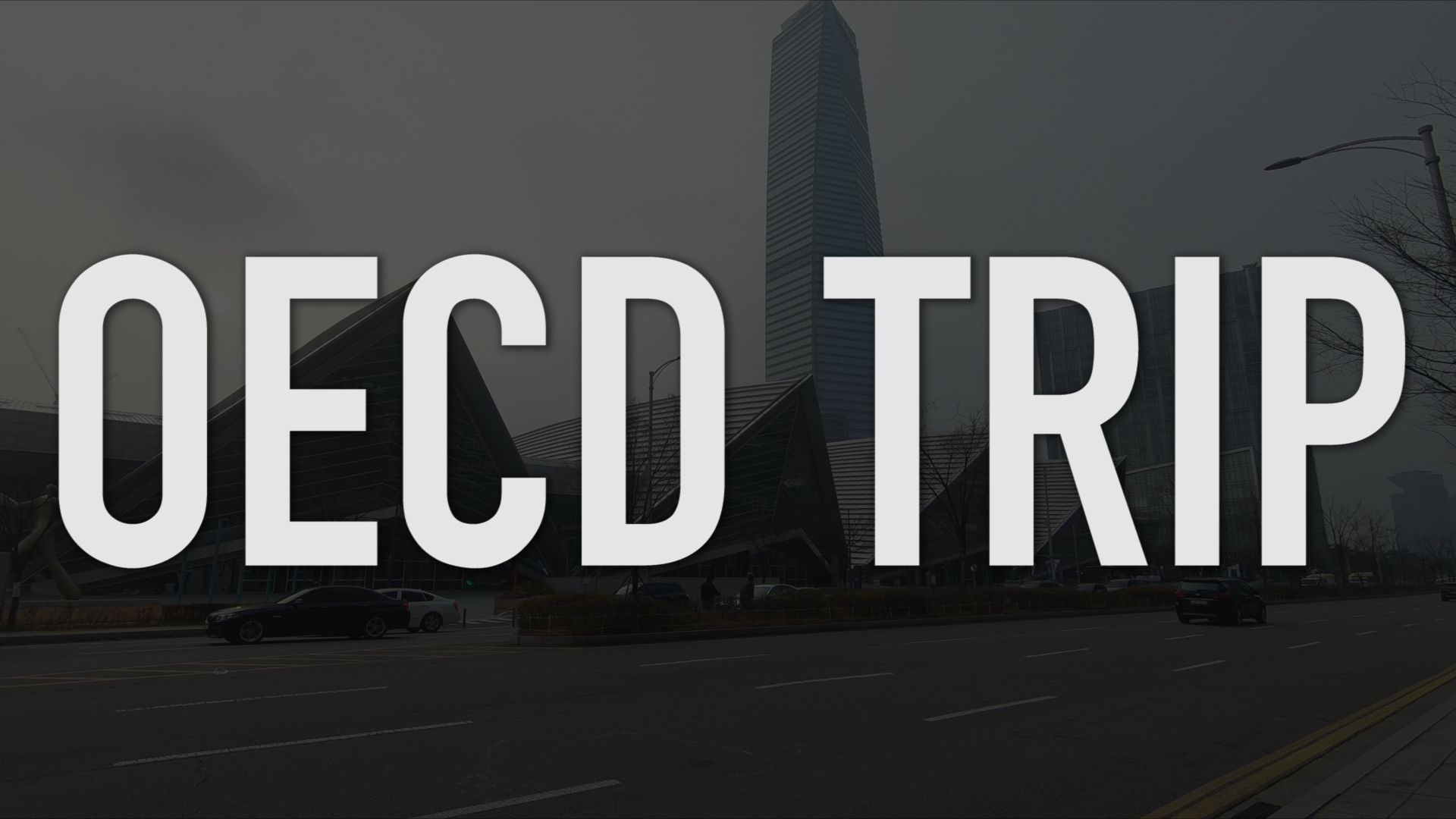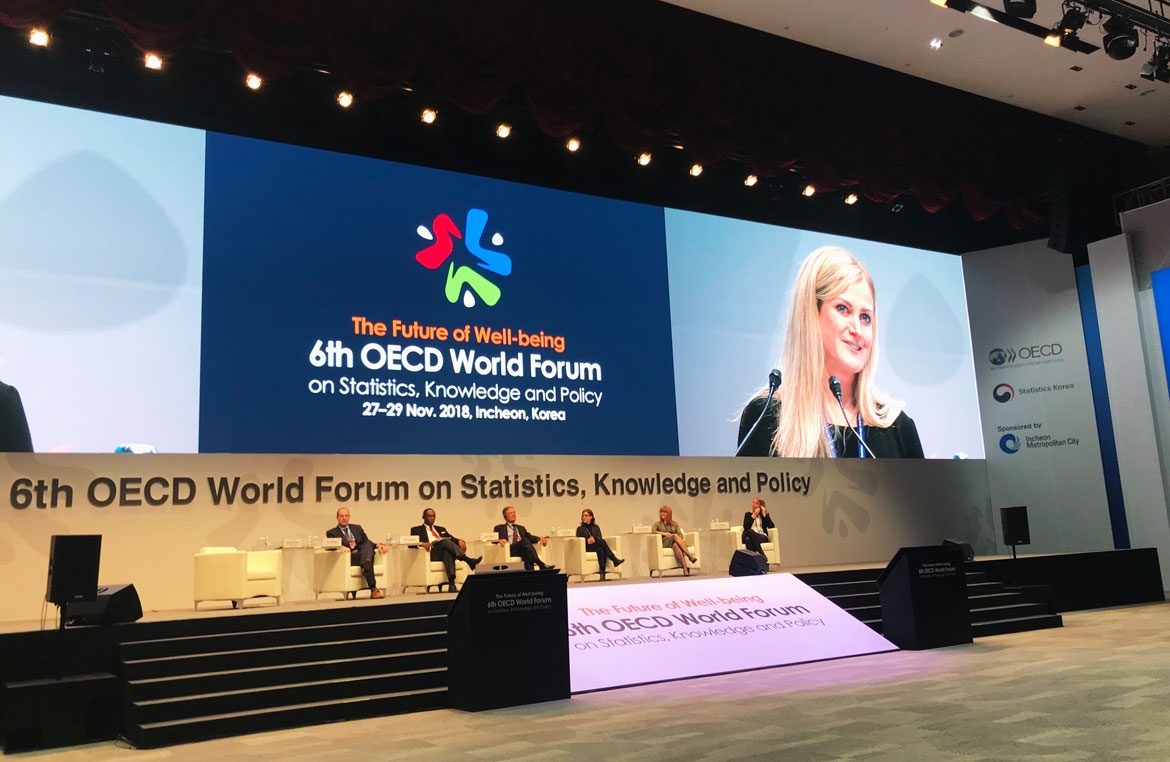In November our documentary film took us to Incheon in South Korea for the OECD World Forum on Statistics, Knowledge and Policy. Here’s a little video from the trip!
[youtube https://www.youtube.com/watch?v=LjNYFjYBitM&w=1110&h=624]

In November our documentary film took us to Incheon in South Korea for the OECD World Forum on Statistics, Knowledge and Policy. Here’s a little video from the trip!
[youtube https://www.youtube.com/watch?v=LjNYFjYBitM&w=1110&h=624]

The last week was intense. We spent three days at the OECD World Forum on Statistics, Knowledge and Policy in South Korea. The title of the conference: “The Future of Well-Being” — and that makes it quite topical for our film, of course. And even more specifically: The “WEGo” initiative — which stands for Wellbeing Economy Governments — was publically launched there, and it is one of the key projects that our film is about.
Here are a couple of tweets that document the launch — Gary Gillespie, Chief Economist for the Scottish Government, posted this after the announcement:
Great to launch WEGo @OECD_Stat World Forum – promoting Wellbeing in economics with @scotgov @DerekMackaySNP pic.twitter.com/JcKzYL7s30
— Gary Gillespie (@Garygillespie42) November 29, 2018
And we ourselves summarised the launch as follows:
Today, the “Wellbeing Economy Governments” — based on an idea by @lofioramonti and @KTrebeck — officially launched at #OECD6WF in a morning session. Very excited to have been there, this will be a central story in our film. #Scotland #NewZealand #iceland pic.twitter.com/TL3y4rxg23
— Wellbeing Economies Film (@wellbeingfilm) November 28, 2018
As we have explained in our initial video on this blog, we are making a film about people who want to help move our world towards a new and different thinking about the economy. That sounds a bit technical, but it concerns every person on this planet — and the rest of the living world, too. If we cannot manage to find another way to run our economies, we will crash and burn our world. And the governments that got together here and launched the WEGo project — Scotland, New Zealand, Iceland — are among the leading governments worldwide in this area.
What makes them different from the rest?
One part of the OECD (an organisation founded to coordinate the economic collaboration among some of the richest countries in the world) is all about numbers. If you want to run an economy, you need numbers. The key number that almost all governments are most interested in is GDP growth. (We talked about what that means in our video about the GDP.) But there are more: the unemployment rate. The exchange rate. The stock market index.
These are the “traditional” measures that economists have been using for decades now, in order to figure out if a country is doing well or not. These numbers helped us a lot to rebuild our world after World War 2, and to build the Western societies of the sixties and seventies — which were incredibly prosperous, and where the idea was developed that every generation will have a better life than the one before. Many decisions that were made in the last fifteen to twenty years were all taken based on these indicators. The Maastricht treaty was designed around the idea that GDP Growth is the thing that every country needs.
Today we are seeing that these traditional indicators do not work anymore. They promote increasingly bad decisions for people and the world. They lead to favouring investors over normal people. They give more and more power to the rich, and tear at the social fabric of our societies. We are getting to a point where it is becoming clearer and clearer that we are no longer creating good and prosperous societies that way. Just the other day we had posted a text that shows how the UK is actually promoting poverty with the way politics are making decisions there — decisions that are taken primarily to promote economic growth.
In other words: the idea that every generation will have a better life than the one before it is being reversed — if we continue like this, the quality of life will drop significantly, for all of us. And we need to do something about this.
The realisation that this whole idea of GDP growth and our over-reliance on “old numbers” must end is not at all new to the statistics people at the OECD. Quite the contrary — they publish studies and talk about what we need to focus on: other numbers, those that promote real wellbeing.
One example: Is it enough to simply ask whether we have less unemployment? Or shouldn’t we start asking what kind of jobs we are creating? It’s not the number of jobs alone, it is the type of jobs and how well they are paid, and what they do to our societies. If you ask that type of question, you will act very differently when Amazon comes and wants to get subsidies for creating jobs in your town or region or country. If you look closely, you may realise that the jobs Amazon can offer may not be good at all for your communities. And so you may say “no, thank you”, to Amazon and try to find investors and companies that offer actually decent jobs.
What we learned at the OECD Forum, in a nutshell, is this: Statisticians and economists from governments all around the world and at the OECD as well have developed many new ways of measuring and assessing whether people and nature in a country, or in all countries around the world, are doing well or not. And they are sharing these ideas at these conferences, they are discussing them, and they have answers and ideas for a different way of organising our world.
But the politicians, the people who actually make these decisions, are not listening yet. Except for a few. The governments of New Zealand, of Iceland, of Scotland — they are. They have started to realise that the old numbers don’t work anymore. They have developed and implemented new numbers and new systems to look at how people are actually doing. And in the WEGo initiative, they are getting together and trying to learn from each other.
That is why the WEGo initiative is so important, and that is why we are following that project for our film.